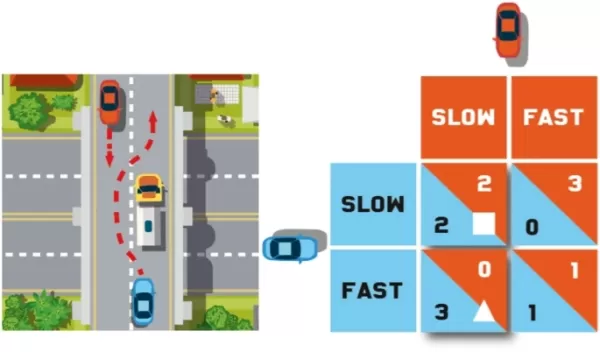Is Robot Exploitation a Global Issue or Influenced by Culture?
A recent study published in Scientific Reports by researchers from LMU Munich and Waseda University Tokyo sheds light on how cultural attitudes influence the way people interact with artificial intelligence. The findings reveal a stark contrast between Japan and the United States, particularly in how people treat cooperative AI agents.
As autonomous technologies like self-driving cars become more integrated into our daily lives, understanding these cultural differences is crucial for their successful implementation across different societies.
Cultural Divide in Human-AI Cooperation
Dr. Jurgis Karpus, the lead researcher from LMU Munich, emphasized the importance of these findings as self-driving technology becomes a reality. "As self-driving technology becomes a reality, these everyday encounters will define how we share the road with intelligent machines," he stated.
The study is one of the first to comprehensively examine how humans from different cultures interact with artificial agents when their interests may not align. It challenges the notion that exploiting cooperative AI is a universal behavior, suggesting that cultural attitudes toward AI could lead to varying integration challenges as autonomous technologies become more common.
Research Methodology: Game Theory Reveals Behavioral Differences
The researchers used classic behavioral economics experiments, such as the Trust Game and the Prisoner's Dilemma, to compare interactions between participants from Japan and the United States with both human and AI partners. These games were designed to simulate real-life scenarios, including traffic situations, where participants had to choose between self-interest and mutual benefit.
The results showed that while American participants were significantly less cooperative with AI than with humans, Japanese participants treated both human and AI partners with similar levels of cooperation.
 Karpus, J., Shirai, R., Verba, J.T. et al.
Karpus, J., Shirai, R., Verba, J.T. et al.
Guilt as a Key Factor in Cultural Differences
The study suggests that feelings of guilt play a significant role in these cultural differences. In the United States, people tend to feel remorse when exploiting another human but not when exploiting a machine. In contrast, Japanese participants reported similar levels of guilt whether they mistreated a person or an AI.
Dr. Karpus noted that Western thinking often views exploiting a robot as harmless because it doesn't have feelings, which may lead to a greater willingness to exploit machines. The study's emotional response data supported these findings, showing that Japanese participants felt more negative emotions and less positive emotions after exploiting AI compared to their American counterparts.
Animism and the Perception of Robots
The cultural and historical context in Japan, with its roots in animism and Buddhist beliefs that non-living objects can possess souls, may explain these differences. This background could lead to a more inclusive perception of robots, making Japanese participants more likely to see AI as capable of experiencing emotions and worthy of moral consideration.
Implications for Autonomous Technology Adoption
These cultural attitudes could significantly impact the adoption of autonomous technologies. Dr. Karpus suggested that Japan's respectful treatment of robots might lead to quicker adoption of technologies like autonomous taxis in Tokyo compared to Western cities.
The study also highlights potential challenges in integrating autonomous vehicles into societies where people are more likely to exploit them, which could affect their efficiency and safety.
Broader Implications for AI Development
The findings underscore the importance of considering cultural factors in the design and deployment of AI systems. Ignoring these nuances could lead to slower adoption rates and potential misuse of AI technologies in different regions.
Limitations and Future Research Directions
While the study provides valuable insights, it focused primarily on Japan and the United States. Further research across a broader range of cultures is needed to understand global variations in human-AI interaction. Additionally, the researchers suggest that field studies with actual autonomous technologies could validate these findings and that more targeted studies are needed to explore the psychological mechanisms behind these cultural differences.
"Our present findings temper the generalization of these results and show that algorithm exploitation is not a cross-cultural phenomenon," the researchers concluded.
Related article
 Hugging Face Launches Pre-Orders for Reachy Mini Desktop Robots
Hugging Face invites developers to explore its latest robotics innovation.The AI platform announced Wednesday that it’s now accepting pre-orders for its Reachy Mini desktop robots. The company first s
Hugging Face Launches Pre-Orders for Reachy Mini Desktop Robots
Hugging Face invites developers to explore its latest robotics innovation.The AI platform announced Wednesday that it’s now accepting pre-orders for its Reachy Mini desktop robots. The company first s
 Nvidia charges ahead with humanoid robotics aided by the cloud
Nvidia is charging full speed ahead into the realm of humanoid robotics, and they're not holding back. At the Computex 2025 trade show in Taiwan, they unveiled a series of innovati
Nvidia charges ahead with humanoid robotics aided by the cloud
Nvidia is charging full speed ahead into the realm of humanoid robotics, and they're not holding back. At the Computex 2025 trade show in Taiwan, they unveiled a series of innovati
 Top 5 Autonomous Robots for Construction Sites in April 2025
The construction industry is undergoing a remarkable transformation, driven by the rise of robotics and automation. With the global market for construction robots projected to reach $3.5 billion by 2030, these innovations are revolutionizing safety and efficiency on job sites. From autonomous pile d
Comments (25)
0/200
Top 5 Autonomous Robots for Construction Sites in April 2025
The construction industry is undergoing a remarkable transformation, driven by the rise of robotics and automation. With the global market for construction robots projected to reach $3.5 billion by 2030, these innovations are revolutionizing safety and efficiency on job sites. From autonomous pile d
Comments (25)
0/200
![ScottPerez]() ScottPerez
ScottPerez
 September 10, 2025 at 12:30:35 PM EDT
September 10, 2025 at 12:30:35 PM EDT
Qué interesante estudio sobre las diferencias culturales en el trato a los robots 🧐 En Latinoamérica apenas estamos empezando a adoptar esta tecnología, pero ya veo cómo algunos países podrían malinterpretar su uso. ¿Será que terminaremos romantizando las máquinas como en Japón o explotándolas como en EE.UU.? Parece que el futuro de la ética robótica dependerá mucho de nuestra idiosincrasia...


 0
0
![JeffreyMartinez]() JeffreyMartinez
JeffreyMartinez
 August 22, 2025 at 11:01:17 AM EDT
August 22, 2025 at 11:01:17 AM EDT
This article got me thinking—cultural views on AI are wild! Japan's all about harmony with robots, while the US seems more skeptical. Makes me wonder how my own culture shapes my take on AI. 🤔


 0
0
![DouglasScott]() DouglasScott
DouglasScott
 August 6, 2025 at 7:01:00 PM EDT
August 6, 2025 at 7:01:00 PM EDT
This article really opened my eyes to how culture shapes our view of AI. Japan’s respect for robots is fascinating, but I wonder if it could lead to over-reliance. Cool study, though! 🤖


 0
0
![RobertSanchez]() RobertSanchez
RobertSanchez
 August 4, 2025 at 7:00:59 AM EDT
August 4, 2025 at 7:00:59 AM EDT
Fascinating read! It's wild how Japan's all about harmony with AI, while the US seems more skeptical. Makes me wonder if cultural vibes shape our trust in robots 🤔. Could this affect global AI ethics?


 0
0
![BillyAdams]() BillyAdams
BillyAdams
 July 27, 2025 at 9:19:05 PM EDT
July 27, 2025 at 9:19:05 PM EDT
Fascinating read! It's wild how Japan and the US have such different vibes with AI. Makes me wonder if cultural lenses shape our trust in robots or if it's just tech hype driving the divide. 🤔 Curious to see how this plays out globally!


 0
0
![WillieAnderson]() WillieAnderson
WillieAnderson
 April 17, 2025 at 8:12:24 PM EDT
April 17, 2025 at 8:12:24 PM EDT
이 앱은 AI에 대한 문화적 관점을 이해하는 데 정말 도움이 되었어요. 일본과 미국의 차이가 이렇게 클 줄은 몰랐네요. 로봇에 대한 우리의 태도를 생각하게 합니다. AI 윤리에 관심이 있다면 꼭 봐야 해요! 🤖🌍


 0
0
A recent study published in Scientific Reports by researchers from LMU Munich and Waseda University Tokyo sheds light on how cultural attitudes influence the way people interact with artificial intelligence. The findings reveal a stark contrast between Japan and the United States, particularly in how people treat cooperative AI agents.
As autonomous technologies like self-driving cars become more integrated into our daily lives, understanding these cultural differences is crucial for their successful implementation across different societies.
Cultural Divide in Human-AI Cooperation
Dr. Jurgis Karpus, the lead researcher from LMU Munich, emphasized the importance of these findings as self-driving technology becomes a reality. "As self-driving technology becomes a reality, these everyday encounters will define how we share the road with intelligent machines," he stated.
The study is one of the first to comprehensively examine how humans from different cultures interact with artificial agents when their interests may not align. It challenges the notion that exploiting cooperative AI is a universal behavior, suggesting that cultural attitudes toward AI could lead to varying integration challenges as autonomous technologies become more common.
Research Methodology: Game Theory Reveals Behavioral Differences
The researchers used classic behavioral economics experiments, such as the Trust Game and the Prisoner's Dilemma, to compare interactions between participants from Japan and the United States with both human and AI partners. These games were designed to simulate real-life scenarios, including traffic situations, where participants had to choose between self-interest and mutual benefit.
The results showed that while American participants were significantly less cooperative with AI than with humans, Japanese participants treated both human and AI partners with similar levels of cooperation.
 Karpus, J., Shirai, R., Verba, J.T. et al.
Karpus, J., Shirai, R., Verba, J.T. et al.
Guilt as a Key Factor in Cultural Differences
The study suggests that feelings of guilt play a significant role in these cultural differences. In the United States, people tend to feel remorse when exploiting another human but not when exploiting a machine. In contrast, Japanese participants reported similar levels of guilt whether they mistreated a person or an AI.
Dr. Karpus noted that Western thinking often views exploiting a robot as harmless because it doesn't have feelings, which may lead to a greater willingness to exploit machines. The study's emotional response data supported these findings, showing that Japanese participants felt more negative emotions and less positive emotions after exploiting AI compared to their American counterparts.
Animism and the Perception of Robots
The cultural and historical context in Japan, with its roots in animism and Buddhist beliefs that non-living objects can possess souls, may explain these differences. This background could lead to a more inclusive perception of robots, making Japanese participants more likely to see AI as capable of experiencing emotions and worthy of moral consideration.
Implications for Autonomous Technology Adoption
These cultural attitudes could significantly impact the adoption of autonomous technologies. Dr. Karpus suggested that Japan's respectful treatment of robots might lead to quicker adoption of technologies like autonomous taxis in Tokyo compared to Western cities.
The study also highlights potential challenges in integrating autonomous vehicles into societies where people are more likely to exploit them, which could affect their efficiency and safety.
Broader Implications for AI Development
The findings underscore the importance of considering cultural factors in the design and deployment of AI systems. Ignoring these nuances could lead to slower adoption rates and potential misuse of AI technologies in different regions.
Limitations and Future Research Directions
While the study provides valuable insights, it focused primarily on Japan and the United States. Further research across a broader range of cultures is needed to understand global variations in human-AI interaction. Additionally, the researchers suggest that field studies with actual autonomous technologies could validate these findings and that more targeted studies are needed to explore the psychological mechanisms behind these cultural differences.
"Our present findings temper the generalization of these results and show that algorithm exploitation is not a cross-cultural phenomenon," the researchers concluded.
 Hugging Face Launches Pre-Orders for Reachy Mini Desktop Robots
Hugging Face invites developers to explore its latest robotics innovation.The AI platform announced Wednesday that it’s now accepting pre-orders for its Reachy Mini desktop robots. The company first s
Hugging Face Launches Pre-Orders for Reachy Mini Desktop Robots
Hugging Face invites developers to explore its latest robotics innovation.The AI platform announced Wednesday that it’s now accepting pre-orders for its Reachy Mini desktop robots. The company first s
 Nvidia charges ahead with humanoid robotics aided by the cloud
Nvidia is charging full speed ahead into the realm of humanoid robotics, and they're not holding back. At the Computex 2025 trade show in Taiwan, they unveiled a series of innovati
Nvidia charges ahead with humanoid robotics aided by the cloud
Nvidia is charging full speed ahead into the realm of humanoid robotics, and they're not holding back. At the Computex 2025 trade show in Taiwan, they unveiled a series of innovati
 Top 5 Autonomous Robots for Construction Sites in April 2025
The construction industry is undergoing a remarkable transformation, driven by the rise of robotics and automation. With the global market for construction robots projected to reach $3.5 billion by 2030, these innovations are revolutionizing safety and efficiency on job sites. From autonomous pile d
Top 5 Autonomous Robots for Construction Sites in April 2025
The construction industry is undergoing a remarkable transformation, driven by the rise of robotics and automation. With the global market for construction robots projected to reach $3.5 billion by 2030, these innovations are revolutionizing safety and efficiency on job sites. From autonomous pile d
 September 10, 2025 at 12:30:35 PM EDT
September 10, 2025 at 12:30:35 PM EDT
Qué interesante estudio sobre las diferencias culturales en el trato a los robots 🧐 En Latinoamérica apenas estamos empezando a adoptar esta tecnología, pero ya veo cómo algunos países podrían malinterpretar su uso. ¿Será que terminaremos romantizando las máquinas como en Japón o explotándolas como en EE.UU.? Parece que el futuro de la ética robótica dependerá mucho de nuestra idiosincrasia...


 0
0
 August 22, 2025 at 11:01:17 AM EDT
August 22, 2025 at 11:01:17 AM EDT
This article got me thinking—cultural views on AI are wild! Japan's all about harmony with robots, while the US seems more skeptical. Makes me wonder how my own culture shapes my take on AI. 🤔


 0
0
 August 6, 2025 at 7:01:00 PM EDT
August 6, 2025 at 7:01:00 PM EDT
This article really opened my eyes to how culture shapes our view of AI. Japan’s respect for robots is fascinating, but I wonder if it could lead to over-reliance. Cool study, though! 🤖


 0
0
 August 4, 2025 at 7:00:59 AM EDT
August 4, 2025 at 7:00:59 AM EDT
Fascinating read! It's wild how Japan's all about harmony with AI, while the US seems more skeptical. Makes me wonder if cultural vibes shape our trust in robots 🤔. Could this affect global AI ethics?


 0
0
 July 27, 2025 at 9:19:05 PM EDT
July 27, 2025 at 9:19:05 PM EDT
Fascinating read! It's wild how Japan and the US have such different vibes with AI. Makes me wonder if cultural lenses shape our trust in robots or if it's just tech hype driving the divide. 🤔 Curious to see how this plays out globally!


 0
0
 April 17, 2025 at 8:12:24 PM EDT
April 17, 2025 at 8:12:24 PM EDT
이 앱은 AI에 대한 문화적 관점을 이해하는 데 정말 도움이 되었어요. 일본과 미국의 차이가 이렇게 클 줄은 몰랐네요. 로봇에 대한 우리의 태도를 생각하게 합니다. AI 윤리에 관심이 있다면 꼭 봐야 해요! 🤖🌍


 0
0





























